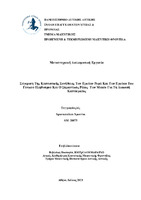Σύγκριση Της Καπνιστικής Συνήθειας Των Εγκύων Ρομά Και Των Εγκύων Του Γενικού Πληθυσμού Και Ο Σημαντικός Ρόλος Των Μαιών Για Τη Διακοπή Καπνίσματος
Comparison of the Smoking Habit of Pregnant Roma and Pregnant Women of the General Population and the Important Role of Midwives in Smoking Cessation

Μεταπτυχιακή διπλωματική εργασία
Συγγραφέας
Χριστοπούλου, Χριστίνα Παναγιώτα
Ημερομηνία
2023-06-19Επιβλέπων
Vivilaki, VictoriaΠερίληψη
Πλήθος μελετών την τελευταία δεκαετία έχει ασχοληθεί με την ολοένα αυξανόμενη καπνιστική συνήθεια των εγκύων γυναικών στην Ελλάδα, αλλά και στις υπόλοιπες Ευρωπαϊκές χώρες. Παρόλα αυτά, στην βιβλιογραφία υπάρχει περιορισμένος αριθμός μελετών που έχουν ερευνήσει την καπνιστική συνήθεια στον πληθυσμό των εγκύων Ρομά. Η αυξημένη κατανάλωση προϊόντων καπνού στην εγκυμοσύνη στις γυναίκες της λαϊκής τάξης, οφείλεται όπως επιβεβαιώνεται και από μεγάλο αριθμό μελετών στην ελλιπή ενημέρωση των γυναικών για τις αρνητικές επιπτώσεις του καπνίσματος, Τόσο στον ίδιο τους τον οργανισμό, όσο και στην υγεία του εμβρύου και αργότερα νεογνού. Στην έρευνά μας επισημαίνεται ότι στον πληθυσμό των Ρομά και πιο συγκεκριμένα των εγκύων Ρομά οι παρεμβάσεις είναι ακόμα πιο περιορισμένες καθώς είναι μία μειονότητα η οποία δεν χρησιμοποιεί συχνά τις υπηρεσίες των δομών της υγείας με αποτέλεσμα να μειώνονται οι ευκαιρίες για μετάδοση πληροφοριών και προτροπής για διακοπή του καπνίσματος.
Σκοπός λοιπόν της παρούσας έρευνας είναι αφενός η αξιολόγηση της καπνιστικής συνήθειας των εγκύων γυναικών Ρομά σε σύγκριση με τις έγκυες του πλειοψηφικού πληθυσμού και αφετέρου η πληροφόρησή τους για τις βλαβερές επιδράσεις της κατανάλωσης προϊόντων καπνού, ιδίως στην διάρκεια της εγκυμοσύνης.
Η παρέμβαση διήρκησε περίπου έξι μήνες. σαν ερευνητικό εργαλείο χρησιμοποιήθηκε το ερωτηματολόγιο το οποίο περιείχε ερωτήσεις που προσέδιδαν πληροφορίες σχετικά με την κατάσταση της υγείας των γυναικών στη διάρκεια της κύησης, και την εμφάνιση πιθανών προβλημάτων, καθώς και ερωτήσεις που στόχευαν στην αξιολόγηση της εξάρτησης τις εκάστοτε εγκύου από τα προϊόντα καπνού.Επιπλέον μας ενημέρωνε για το επίπεδο μόρφωσης και την οικονομική τους κατάσταση, που σύμφωνα με τη βιβλιογραφία είναι άρρηκτα συνδεδεμένη με το κάπνισμα. Το ερωτηματολόγιο συμπληρώθηκε από έγκυες Ρομάκαι έγκυες του γενικού πληθυσμού. Άλλοτε συμπληρώνονταν από την ίδια την έγκυο και άλλοτε αναλόγως τις μορφωτικές τις ικανότητες, υπό την δική μας καθοδήγηση, από κάποια άλλη έγκυο Ρομά που μπορούσε να ανταπεξέλθει στην ανάγνωση και συμπλήρωση του ερωτηματολογίου.
Από τα αποτελέσματα της έρευνας γίνεται αντιληπτό ότι μεταξύ των εγκύων Ρομά και των εγκύων του πλειοψηφικού πληθυσμού υπάρχουν σημνατικές διαφορές ως προς το καπνίστικό τους προφίλ και την συνήθεια κατανάλωσης προιόντων καπνού. Οι έγκυες Ρομά είναι πιο επιρεπείς στις βλαβερές συνέπειες του καπνίσματος, καθώς πέραν του αυξημένου ποσοστού του ενεργητικού καπνίσματος εκτίθονται αρκέτα και στο παθητικό κάπνισμα. Αυτό συμβαίνει λόγω συμβίωσης με μεγάλο αριθμό ατόμων στον ίδιο χώρο αλλά και λόγω ότι ο λαός των Ρομά υιοθετεί το κάπνισμα ως τρόπο και στάση ζωής. Η ελλιπης ενημέρωση από τους επαγγελματίες υγείας για τις επιπτώσεις του καπνίσματος το χαμηλό μορφωτικό και οικονομικό επίπεδο είναι βασικοί ανασταλτικοί παράγοντες για την διακοπή του τσιγάρου σε σχέση με τις έγκυες του γενικού πληθυσμού. Η σπουδαιότητα του ρόλου των μαίων είναι ύψιστης σημάσιας και για τις δύο ομάδες των συμμετεχόντων καθώς θεωρούν πολύ σημαντική την βοήθεια της μαίας για την αποχή από τα προιόντα καπνού.
Περίληψη
Many studies in the last decade have dealt with the ever-increasing smoking habit of pregnant women in Greece, but also in the rest of the European countries. However, in the literature there is a limited number of studies that have investigated the smoking habit in the pregnant Roma population. The increased consumption of tobacco products during pregnancy among women of the popular class is due, as confirmed by a large number of studies, to women's lack of information about the negative effects of smoking, both on their own body and on the health of the fetus and later the newborn. In our research it is pointed out that in the Roma population and more specifically in pregnant Roma, the interventions are even more limited as they are a minority that does not often use the services of the health structures, as a result of which the opportunities for transmitting information and exhortation to stop smoking.
The purpose of this research is, on the one hand, to evaluate the smoking habit of pregnant Roma women compared to pregnant women of the majority population and, on the other hand, to inform them about the harmful effects of the consumption of tobacco products, especially during pregnancy.
The intervention lasted about six months. as a research tool, the questionnaire was used, which contained questions that provided information about the state of health of women during pregnancy, and the appearance of possible problems, as well as questions aimed at evaluating the dependence of each pregnant woman on tobacco products. In addition, he informed us about their level of education and economic status, which according to the literature is inextricably linked to smoking. The questionnaire was completed by pregnant Roma and pregnant women from the general population. Sometimes they were completed by the pregnant woman herself and sometimes, depending on her educational abilities, under our guidance, by another pregnant Roma woman who could cope with reading and completing the questionnaire.
From the results of the research, it can be seen that between pregnant Roma and pregnant women of the majority population there are significant differences in terms of their smoking profile and the habit of consuming tobacco products. Pregnant Roma women are more susceptible to the harmful effects of smoking, as in addition to the increased rate of active smoking, they are also exposed to passive smoking. This happens because of coexistence with a large number of people in the same space but also because the Roma people adopt smoking as a way of life and attitude. Insufficient information from health professionals about the effects of smoking, low educational and economic level are key inhibiting factors for smoking cessation in relation to pregnant women in the general population. The importance of the role of midwives is of the utmost importance for both groups of participants as they consider the midwife's help to abstain from tobacco products very important.

